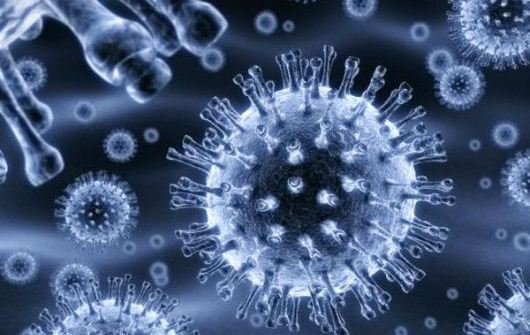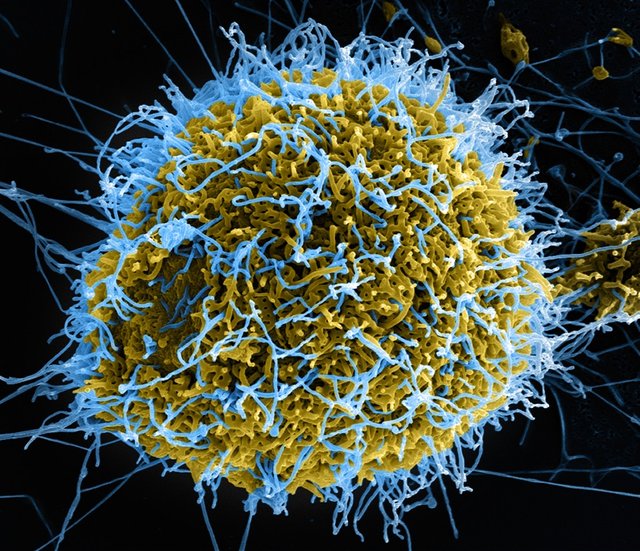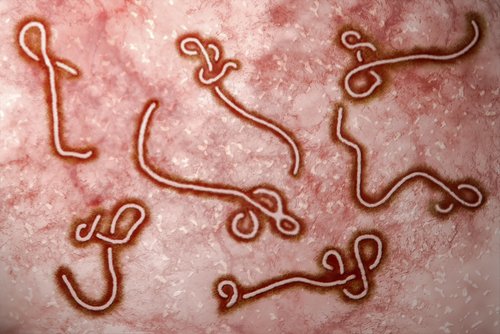Ebola Virus
Ebola is a virus. A virus is a very small thing.A bit of RNA or DNA and a few proteinsand a hull. It has no ability to do anythingby itself whatsoever and can only survive and proliferate by infecting cells. To avoid this we have the immune system. So usually dendritic cells will activate the army of anti-virus cells, support cellsand anti-body factories that work together with the guard cellswipe out the infection in a matter of days.

But when Ebola strikes, it directlyattacks the immune system. Some of the first cells it takes over are the dendritic cells, the brains of the immune system. The Ebola virus enters a dendritic cell bybinding into receptors for cell transport. Once it is inside, it dissolves its outer hull and releases its genetic material, nucleoproteins and enzymes. In a nutshell it takes over the cell,disables the cells protective mechanisms and reprograms it.

The cell now becomes a virus production machine and uses its resources to build Ebola viruses. Once the cell is saturated, it dissolves the cell membrane and millions of viruses are released into the tissue.The virus not only prevents the dendritic cells from activating the specialized and anti-virus forces, it manipulates them into sending signal proteins that tricks specialized cells into ending their own life's prematurely. So the immune system is seriously disrupted and unable to react. When the virus rapidly multiplies, we're talking billions,there are cells that should deal with infected cells, the natural killer cells, but they also get infected and just die before they can prevent the disease from spreading. At the same time Ebola infects the guard cells of the body macrophages and monocytes, not only managing to circumvent their defenses, it also manipulates some to signal to the cells make up the blood vessels telling into release fluid into the body Usually this makes sense, but in this case it just causes mayhem.

All of the body's neutrophils are activated awaken by the virus and the acrophages signals then are not very effective against viruses and should not be involve in this fight begin to do lots of stuffs they shouldn't do. The neutrophils signals to the blood vessels to release more fluid causing internal bleeding.Another area of the body Ebola attacks is the liver.The virus finds it very easy to enter the liver and it quickly starts killing loads of liver cells and causing organ failure and more internal bleeding. And all those things are going on at the same time. As the virus spreads, it's like nukes exploding every where. One incident of this in one region will be problem enough But now is starting to happen everywhere at once. All the mechanisms of the immune system have evolve to handle infections work against you. And the virus continues to spread and spread. And finally begins to infect more and more body cells while the body desperately struggles to stay alive. In a desperate last effort to turn the tide the immune system launches a cytokine storm. A cytokine storm is an S.O.S signal that causes the immune system to launch all of its weapons, all at once in a desperate kamikaze attack.This hurts the virus but leaves behind tons of collateral damage, Especially in the blood vessels.

Paradoxically the healthier the immune system, the more damage it can do to itself More and more fluid leaves the blood stream. Blood pours after every opening of the body. You become seriously dehydrated that just not now blood left to supply the organs with oxygen and cells begin to die. If you reach this point the chance of you dying is very high. Currently six out of ten infected die from Ebola. But currently the only way to get infected by Ebola is to come into contact with the body fluids of a person who shows symptoms from infected bat. Ebola has killed 5,000 people since June 2014.The common flu kills up to 500,000 people each year. Malaria causes up to one million each year.3000 People every single day.
Hi! I am a robot. I just upvoted you! I found similar content that readers might be interested in:
https://www.read-videos.com/education/20141106/1/the-ebola-virus-explained-mdash-how-your-body-fights-for-survival